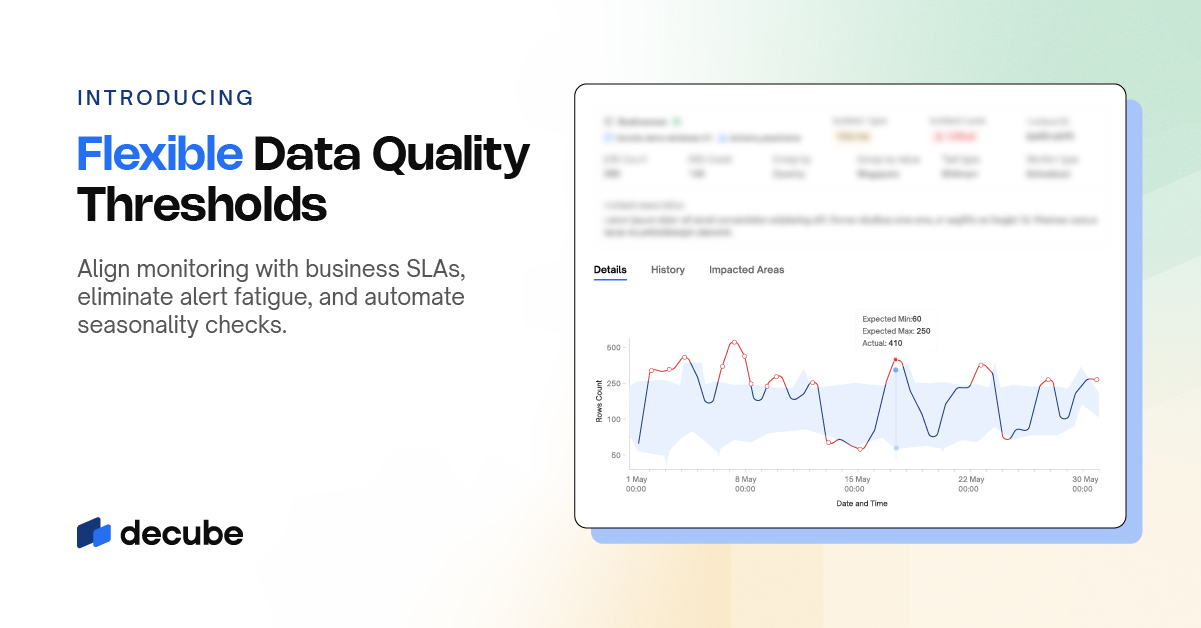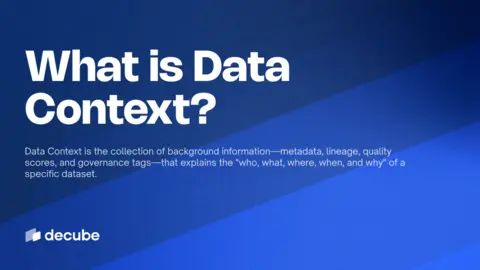Kindly fill up the following to try out our sandbox experience. We will get back to you at the earliest.
Metadata Management: What is it?
Explore the essentials of Metadata Management, its impact on data governance, and how it enhances data asset quality and compliance.

What is Metadata Management?
"In God we trust. All others must bring data."
This quote from statistician W. Edwards Deming highlights the importance of metadata. In today's world, trusting data is key, and metadata helps build that trust.
I've seen how metadata management can change a company's data strategy. It adds context and structure to data, like a compass in a sea of information. This turns data into useful insights, improving data quality and work efficiency.
Using strong metadata management is more than just a technical need. It's a strategic choice that makes your data system simpler. It leads to better data finding and follows rules better. As we explore this topic, you'll see why metadata management is essential for a good data strategy.
Key Takeaways:
- Metadata management is essential for data governance, data asset quality, and compliance.
- It involves managing contextual information about data, enabling effective data discovery and usage.
- Metadata plays a strategic role in driving digital transformation and enabling intelligent data management.
- By implementing metadata management, businesses can improve data quality, decision-making, and regulatory compliance.
- The use of AI and machine learning enhances metadata management capabilities and data insights.
"Metadata management is like a GPS for your data. It guides you in discovering and understanding your data, ensuring you reach your destination of data-driven success." - John Smith, Data Analyst
What do statistics say about Metadata?
Did you know? 83% of organizations experienced problems with their data quality, with the majority citing missing or inaccurate metadata as a key issue. The typical company loses 10% to 20% of its income due to poor data quality. The biggest single reason metadata matters is the growth of content and the proliferation of content throughout the enterprise," said the head of technology at a global business news website. These statistics show the significance of metadata in ensuring that data is accurate and trustworthy and that it can be efficiently used to make educated decisions. This highlights the importance of metadata in data management and the need for effective metadata strategies.
Metadata is conceptualized on the premise that data has value in addition to its intended use and that metadata makes that value visible. Metadata enables data to be understood in the context of its creation, use, and management. It also facilitates data reuse by providing information about its structure, content, and context.
Metadata can take many forms, including descriptive metadata, structural metadata, administrative metadata, and preservation metadata. We will discuss it in detail about it in the types section.
Why is Metadata Important for Data Management?
Metadata is essential for effective data management, providing information about a dataset's characteristics, context, and meaning. To understand better, here are some reasons why metadata is crucial for data management:
- Enables data discovery and access: Metadata makes it easier for users to discover and access relevant data. Descriptive metadata, for example, provides information about the content of the data, helping users identify and select data that meets their needs.
- Enables data reuse and integration: Metadata provides information about the structure, content, and context of data, enabling it to be reused and integrated into new applications and systems. Structural metadata, for example, can help developers understand the relationships between different data elements and use them to build new applications.
- Ensures data accuracy and reliability: Metadata helps ensure data is accurate and reliable by providing information about its quality and provenance. Administrative metadata, for instance, might give specifics about who collected the data, how it was evaluated, and how it was collected, assisting in ensuring its accuracy and dependability.
- Facilitates compliance and governance: Metadata helps ensure compliance with regulations and internal policies by providing information about data ownership, usage, and management. Administrative metadata, for instance, can provide information about access rights and data retention policies, helping to ensure that data is used appropriately and stored securely.
- Supports data preservation and archiving: Metadata is essential for long-term data preservation and archiving. Preservation metadata, for example, can provide information about the data's format, structure, and technical specifications, ensuring that it can be accessed and used in the future.
- Enhances the quality and usability of data: By supplying details on the structure, content, and context of data, metadata can aid in enhancing the quality and usefulness of that data. Descriptive metadata, for example, can provide information about the meaning and purpose of data elements, helping users understand how they relate to each other and how they can be used.
Metadata is a critical aspect of data management, providing essential information about data that helps users discover, access, and use it more effectively.
"Metadata management is the key to unlocking the potential of your data assets and establishing effective data governance practices. It provides the necessary context and structure for data governance frameworks to thrive, ensuring that data is properly managed, protected, and utilized for business objectives."
Managing the Breadth of Data
In order to effectively manage metadata, it is crucial to handle the breadth of data across the enterprise. This involves collecting metadata from various sources and managing different types of metadata that provide valuable insights into the data ecosystem.
Types of Metadata
The four types of metadata that must be managed are:
- Technical Metadata: This type of metadata includes database schemas, mappings, and code. It provides a deep understanding of the technical aspects of the data, enabling effective data integration and interoperability.
- Business Metadata: Business metadata includes glossary terms and governance processes. This type of metadata helps in establishing common data definitions, ensuring clarity and consistency in data interpretation across the organization.
- Operational and Infrastructure Metadata: Operational and infrastructure metadata encompasses run-time stats and time stamps. It provides critical information on data usage, tracking data flow, and monitoring data quality in real-time.
- Usage Metadata: Usage metadata comprises user ratings, comments, and access patterns. It offers insights into how data is being utilized, guiding decision-making and identifying areas for improvement.
By effectively managing these different types of metadata, organizations can gain a holistic view of their data ecosystem and ensure that data is accurate, relevant, and accessible to stakeholders across the enterprise.
Use Cases of Metadata
Metadata has many use cases in data management, including:
- Discovery and access: Metadata enables users to discover and access relevant data by providing information about the data's content, structure, and context.
- Reuse and integration: Metadata enables data to be reused and integrated into new applications and systems by providing information about its structure, content, and context.
- Compliance and governance: Metadata enables compliance and governance by providing information about data ownership, usage, and management.
- Preservation and archiving: Metadata enables long-term preservation and archiving of data by providing information about the data's format, provenance, and authenticity.
Metadata provides a way to manage, organize, and access data more effectively. Metadata provides information about a dataset's characteristics, context, and meaning, enabling users to discover, access, and use data more effectively. By understanding the concept of metadata and its use cases, organizations can better manage their data and make it more accessible and valuable to users.
How Metadata Management Works
Metadata management plays a crucial role in harnessing the power of data. But how does it actually work? Let's dive into the process of metadata collection, curation, and intelligent management.
First, metadata collection involves gathering information about the data systems and assets within an organization. This includes extracting metadata from various sources such as databases, files, and applications. The collected metadata provides vital details about the structure, format, and content of the data.
Next comes metadata curation, where the collected metadata is enriched with relevant business context. This step involves categorizing and organizing the metadata based on its purpose and usage. By adding descriptive attributes, relationships, and classifications, the curated metadata becomes more valuable and insightful.
But what sets intelligent metadata management apart is the application of AI/ML technologies. AI-powered metadata management tools go beyond traditional approaches, leveraging machine learning algorithms to derive hidden relationships and insights from the collected and curated metadata.
Intelligent metadata management uses AI/ML to uncover connections and patterns that may not be immediately evident in the collected metadata. It provides a deeper understanding of data assets, enabling better decision-making and data analytics.
The metadata forms the foundation for data analytics and data science tools, empowering organizations to gain valuable insights and intelligence. With a well-managed metadata framework, businesses can enhance their data analytics capabilities, drive innovation, and make data-driven decisions.
To give you a better visual representation, here's a brief table summarizing the process of how metadata management works:
Tools for Metadata Management:
Metadata management can be a complex process that involves creating, storing, and maintaining metadata. But there’s no need to worry. Fortunately, many tools are available to help organizations manage their metadata effectively. Throwing light on some of the most popular tools for metadata management:
- Metadata management software: Metadata management software is designed to help organizations manage their metadata. These tools can help automate metadata creation and maintenance, ensuring that metadata is accurate and up-to-date.
- Data modeling tools: Data modeling tools can help organizations create and manage metadata by visualizing data structures. These tools can help identify relationships between data elements and ensure that metadata is consistent across different systems.
- Data cataloging tools: Data cataloging tools provide a centralized repository for metadata, making it easier for users to find and access data. These tools can also help track data lineage and provide insights into how data is used within an organization.
- ETL (Extract, Transform, Load) tools: ETL tools can help automate the process of extracting metadata from source systems, transforming it into a standardized format, and loading it into a metadata repository. These tools can help organizations manage large volumes of metadata more efficiently.
- Ontology and taxonomy tools: These tools help organizations manage metadata by providing a standardized vocabulary for data elements. These tools can help ensure that metadata is consistent and meaningful across different systems.
Using these tools, organizations can guarantee that their metadata is precise, current, and consistent, making it simpler for users to search and use data.
Best Practices for Managing Metadata
We discuss below some best practices for managing metadata:
- Define metadata standards and policies: Define metadata standards and policies to ensure consistency and accuracy across different data sets.
- Use tools for managing metadata: Employ tools for managing metadata to automate managing, editing, and creating metadata.
- Use a controlled vocabulary: Use a controlled vocabulary to ensure consistent terminology and improve metadata accuracy.
- Implement metadata quality control: Implement metadata quality control to ensure metadata accuracy, completeness, and consistency.
Importance of Metadata for this data-driven world:
Metadata is more crucial than ever because it enables organizations to leverage the power of data to accomplish their objectives as data grows increasingly plentiful and complex. Organizations can improve data quality, facilitate data discovery and access, and ensure compliance with regulations and policies by effectively managing metadata. As we traverse the data-driven world, the significance of metadata will only increase, making it crucial for organizations to invest in metadata management and stay on top of the game.
Decube is unified platform which manages metadata along with data observability features which makes it easy for a user to learn for any incidents, signup now
Frequently Asked Questions (FAQ's):

_For%20light%20backgrounds.svg)
















